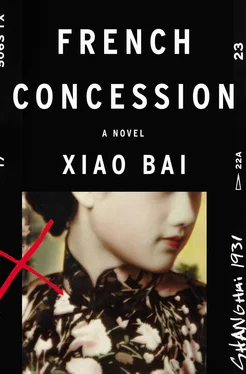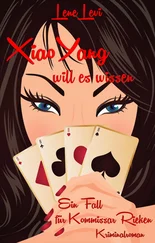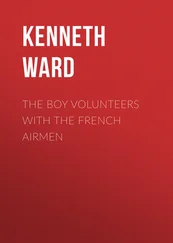As soon as she had left the Viennese sausage shop on Route Dollfus, Therese could sense that something was not quite right. She kept glancing at the opposite sidewalk, or looking surreptitiously over her shoulder by pretending to rearrange her hair, but she could not see anything. She did feel a pair of eyes on her.
She had spent the morning at a tailor’s on Yates Road. Gold Tooth P’an was an old friend of hers, and Therese had recommended him to Margot. The man can make a perfect copy of any dress from a faded movie poster, she had said. Margot had brought a light blue piece of taffeta that reminded Therese of her childhood — her tenth birthday, in fact, when she had worn a dress with a thick hemline and silver bells under the hem. Or was that a scene in a movie? She had told so many stories about her past that she could no longer remember which ones were true.
The dress was not ready yet, but they would try out the fit.
“Look-See, Missie?”
P’an spat pidgin English in a hoarse voice that sounded like fingernails scraping across taffeta. He stitched a dress together loosely and handed it to Margot, who came out of the dressing room looking like a blue daisy. Brenen would love this open-back dress. It would allow his hand to slide down the small of her back all the way to its natural resting place. Margot always reported exactly what went on between herself and Mr. Blair, so Therese had heard all about that afternoon when they had gotten lost by Rubicon Creek, under the Great War memorial. She could picture them there, Margot in her English equestrian outfit, leaning against the wobbly branch of a tree, Brenen’s hand, and Margot flushing the whole time as if the branch were still brushing against her cheek.
This made her think of Hsueh, whom she had not seen in a week. That young half-Chinese man. She figured she could be ten years older than he, probably more like five or six. But he was a Chinese man with smooth skin, and she had to admit she liked him — she even liked that clean baking-soda smell he had.
Therese had slept with singers, illustrators, tipsy men from Lily Bar. She was used to intimacy with strangers. One of them was a Czech Jew who did cartoons of naked men and women on the Astor’s notepads, in which the men’s dicks stuck out as sharply as the black chimneys on English battleships on the Whampoa. But as far as Therese was concerned, not even the artist’s pencil was a match for Hsueh’s camera.
Hsueh, the amateur photographer, the sham dilettante. He loved fumbling around in the dark in her room at the Astor — the Chinese half of him refused to switch the light on, open the windows, or draw the curtains. He did not like the breeze off the Whampoa at night. Like all Chinese people, he was wary of catching cold. Even in the dark, Hsueh’s fingers were perfectly accurate, as if he were measuring out chemicals in the darkroom. When he photographed her in the darkness, Therese would glimpse his pale face for a split second when the magnesium powder flared.
Route Dollfus was short and curved slightly. A network of narrow alleyways, the longtangs , crisscrossed the French Concession, real estate developers claimed tracts of land at will, and even the Municipal Office’s urban planning was in disarray. The Concession was perfect if you had something to hide.
At the fork in the road, Therese changed her mind and turned onto Route Vallon. She stubbed her cigarette out on the iron grille outside a Russian bookstore, and threw the cigarette end into the semibasement window just below the display. Without turning around, she walked up to the adjacent Russian-owned art studio and stopped in front of its display window.
A sign in the window said ART DECORATION STUDIO, ORDERS TAKEN in ugly cursive print. It contained shelves full of multicolored boxes, and framed oil paintings hung above them. One of them was of a large black bird staring obliquely out the window from its only eye. The bird’s beak looked like a sickle. It was pointing at a sculpture of a naked woman, who was entirely white except for a helmetlike shock of black hair.
Between the beak and the naked woman’s breast hung a mirror with a gaudy frame. Just what she wanted. She studied the mirror carefully. Sunlight streamed onto the wall. The rickshaw man had left his rickshaw on the curb while he squatted in the corner, smoking a cigarette. There was no one else under the parasol tree.
Back at her apartment, Therese turned the key in the copper Eveready lock. Yindee stood in the middle of her living room while Zung was sprawled on the sofa. Ah Kwai put a cape jasmine on the round side table by the window, filling the room with its dank scent.
Zung had just arrived from Hong Kong. He was examining a book of movie posters with his chin pressed to it, peering at the photographs from different angles. He had a sharp chin that reminded Therese of pictures of Chinese concubines.
Running in to serve them tea, Ah Kwai laughed and dashed out again. She had come to Shanghai with Therese from Hong Kong, and Zung sometimes brought her Cantonese sweets. The room was heavy with the scent of Chinese jasmine tea, which Therese loved. Zung was always teasing her, claiming that Russian tea stank of camel piss. Apparently the Russians had complained that tea tasted different when it was shipped in by train, having gotten used to tea saturated with the sweat of camels carrying merchants across the Gobi Desert from Shan-hsi. Wily Chinese merchants consequently began soaking their sacks of tea leaves in camel urine for a few days before delivering it.
Zung typed out invoices on a stack of light-blue paper with his Underwood typewriter. Each month he brought large sums of cash from Hong Kong and deposited it in her personal account. She never asked him how much he kept for himself. For the past hundred years, foreign businessmen who prospered in China had refrained from asking such questions of the compradors , their middlemen, and everyone had done well out of the bargain.
Therese herself sourced the goods. Recently a man called Heinz Markus had written to her on behalf of Carlowitz and Co. from Berlin. He reported that Carlowitz was prospering, especially now that it was officially sponsoring the National Socialist Party. As long as Therese’s firm brought in the orders, Carlowitz could fill them. The Germans had lost a large share of the Asian market during the Great War, and they were anxious to make up lost ground. It was rumored that the National Socialists didn’t much like Jewish people, but Therese ignored them. This was Asia. If you made money, no one could touch you.
At least she no longer had to sleep with the skippers in exchange for lower shipping rates. They all came ashore horny and exhausted from steering their run-down freighters all through the Indian Ocean and South China Sea. Once her shipping lines had been set up, the money started flowing in, and she now had a steady stream of business. In Hong Kong, Shanghai, and even in Hanoi, Zung had friends he could count on. He and his family had collaborated with foreigners for a century. As long as the Europeans were willing to contribute their cash and connections, they could cut a deal with anyone: the government, warlords, the police, the gangs, and an assortment of big-time and small-time crooks.
In Hong Kong, Zung ran a wholesale hardware store on Chatham Road that also dabbled in retail. His light-blue records listed a curious transaction.
“Why did it have to be customized? And did it have to cost that much?” she asked.
“It was a birthday present for the mistress of an eccentric Indian businessman,” he explained.
The pistol had been set with precious stones and covered with gold leaf. The businessman specially requested that a piece of ancient Chinese jade with an etching of a belly dancer be set in the stock of the gun. The man smelled of curry. He wanted a thin line etched into the jade inside the folds of her dress — he apparently believed that his mistress had been a virgin until they met, which was what her mother had told him.
Читать дальше












